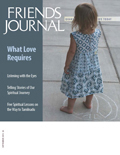If the Quaker faith were a tree, it would bear the scars of conflict but also the gnarly character of an unstoppable organism that has grown through its obstacles.
In this issue’s feature “What Love Requires” (p. 6), George Schaefer writes:
Often in meeting, unmentionable or untouchable conflicts simmer for years resulting in overly contentious business meetings and smaller and smaller attendance. Have we become overly concerned with inclusivity and acceptance and the appearance of harmony at the expense of the unity and peace which are fruits of the Spirit?
We must not view conflict as an obstacle to us in proceeding along our spiritual path. We must see that the conflict is the path. It is a natural part of life, and our task is first to name it and then to grow through it, whether the conflict involves individual behavior, group dysfunction, or an expanding awareness that what Love requires is for us to be prepared to dismantle our own structures and processes.
A conflict between love and process wore heavily on many Friends as we gathered in the Lehigh Valley in late July for the 333rd annual sessions of Philadelphia Yearly Meeting. An overworked and underpopulated standing committee had recently set a policy that threatened to do the opposite of its stated purpose, humiliating transgender youth rather than embracing and supporting them. A conflagration of protest spread on the Internet, riling Quakers locally and worldwide and exposing the deep disappointment and hurt that this policy was poised to wreak if it took effect. Just days before the annual session, the clerk of Philadelphia Yearly Meeting went out on a limb. She took the unusual step of suspending the transgender youth policy by her own action (after consulting with her assistant clerks). While it was clear that the policy was unlikely to withstand corporate discernment, Friends are wary of the veto power that the clerk’s action implied. I, for one, did not know quite what to expect. How would the community react to and resolve the miasma of deficient process and a clerk’s extraordinary act?
To our credit, Friends did not shy away from this conflict or bury it in committee. What happened when we worshiped as a yearly meeting body made me tearfully proud of Friends and of our capacity for growth and care as a body. Apology and forgiveness. Deep sharing. Deep listening. A determination to get to the bottom of what afflicts us and to foster wholeness.
An experienced Friend spoke the minds of many when he testified that “Processes should never be our god. There are times—rare—to step outside processes and be faithful to the most fundamental of Friends processes, which is to listen to the Inward Spirit.”
My Quaker experience spans but a fraction of my venerable yearly meeting’s lifetime, but I’ve seen enough to know that Spirit does not shy from obstacles in its path or chart a different course. Like the tree—slow, organic, and with roots that ground it and leaves that breathe oxygen into the world—when we are attentive to it, Spirit grows through our conflict.
Yours in peace
Gabriel Ehri, Executive Director





Comments on Friendsjournal.org may be used in the Forum of the print magazine and may be edited for length and clarity.